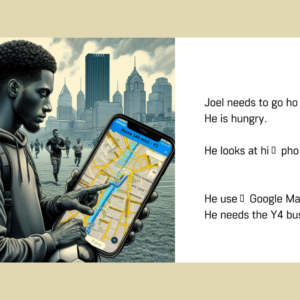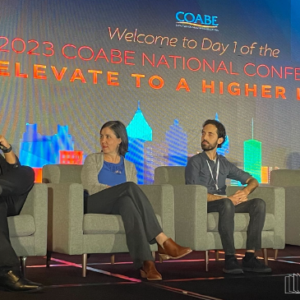By David J. Rosen, Ed.D.
A learning circle is a group led by a teacher, staff member or volunteer facilitator whose members all share an interest in the same subject or topic. It’s a non-formal, organized study circle that includes an online course or other online learning resources. Learning circle topics have included English language learning, high school equivalency preparation, public speaking, storytelling, fiction writing, American Sign Language, basic computer skills, work-related learning and many other topics. In addition to the online learning, they typically meet once a week, face-to-face, for 90 minutes to two hours for a set number of weeks, typically ranging from four to 12. The main host of learning circles in communities in the U.S. is public libraries; however, an increasing number of adult ESOL programs are also offering them to help adults on their waiting lists for English classes, to supplement or intensify their English language learning in classes, and for other reasons.
This article is about how, through offering learning circles, adult ESOL programs can help immigrant community members to quickly learn and effectively use free or low-cost apps to improve their English language skills. Toward the end of the article is a list of adult ESOL programs from New England that participated in an 18-month pilot project called English Now! in which the generic learning circle model was customized for adult ESOL programs by World Education in partnership with P2PU. I was the evaluator of that pilot project and continue to serve as an advisor. With funding from the Dollar General Literacy Foundation, it is now being scaled up to adult ESOL programs in several states.
In the U.S. we now have a large number of free or inexpensive online learning applications (apps) for smartphones. Some have been explicitly designed for adult basic skills and workforce development students including: adult basic literacy; high school equivalency exam preparation; U.S. citizenship test preparation; and the focus of this article, ESOL. Many of these apps have been part of an international competition known as the Adult Literacy XPRIZE; its goal has been to incentivize developers to build effective learning apps for adult immigrant English language learners and for low-literate native English-speaking adults. There are now five finalist apps, and an upcoming national “communities competition” designed to get the word out about the winning app(s); there are also three more apps that were semi-finalists, and dozens more apps that were completed as part of the competition. Some are available directly to adult learners, and others to the programs that serve them. Most immigrant adults who regularly use smartphones do not know these apps exist, how to use them effectively for their learning, or how to get support for using them. Adult ESOL programs that offer an App-to-Speed learning circle can meet those needs. The goal is to help immigrants who need to learn English feel comfortable and competent in using an adult English language app to improve their English reading and writing skills. They may need more than a particular app has to offer, but the app can help, and the learning circle can help prepare them to use the app well, and, if they wish, to succeed in English language classes.
Preparing to offer an App-to-Speed learning circle in your ESOL Program
There are two key roles in setting up and offering App-to-Speed learning circles: an administrative role, usually carried out by a program director or a volunteer coordinator, and the learning circle facilitator role. Here’s a description of these roles:
The role of the program director or volunteer coordinator:
- Learn about learning circles. P2PU, a not-for-profit organization, and the major sponsor of learning circles in the U.S. and in other countries, can help with that. Its website, http://p2pu.org has many materials describing what learning circles are and how they are being used, as well as links to short YouTube learning circle videos. Most learning circles are held in public libraries, but some are also held in adult English language programs located in community-based organizations or public schools. They could also be located in community colleges, and in other community organizations.
- Market the App to Speed learning circle and recruit immigrant adults who want to improve their English language skills. Offer adult immigrants on waiting lists for English classes an opportunity to learn how to use their smartphone while they wait to enroll in a class or, once enrolled, to supplement their classroom learning. One of the XPRIZE app developers recently found that when learners had access to the app on their smartphone, their usage time was 400% greater than when they only had access by computer. There may be many reasons for this, for example, that learners may have smartphones but not home computers, that smartphones are always with them and can be used when they have time for short bursts of skills learning or practice, and possibly because a criterion for an app reaching at least the semi-final stage of the Adult Literacy XPRIZE competition was that it was engaging; adult learners have found that some of these apps are fun! Most, now sometimes all, adult learners enrolled in English language classes have smartphones but don’t know they can use – or know how to use – them for learning. A four-12-week learning circle can help them download free or low-cost learning apps, learn how to use them well and, equally important, help them build an online or face-to-face support group with others in their program who are also using the same app(s).
- Choose an app. At the end of this article is an annotated list of the Adult Literacy XPRIZE finalist apps. I am not recommending any particular app, nor have I reviewed all the apps. There are many more English language apps, of course, that can be found on Google Play, or in the Apple app store, or through an Internet search. In considering an app it is important to take into account which operating system(s) your learning circle participants will use. All the XPRIZE adult literacy apps will operate on Android phones, but only a few will operate on iPhones, so it might be best to choose an app that will work on Android phones.
- Become familiar with how to use the Learning Management System of the app so, if you wish, you can look at participant progress. This is also useful for the learning circle facilitator (this role is described below) to know how each person is doing, to offer help, encourage use, or acknowledge learning by awarding certificates.
- Recruit and train a (volunteer) learning circle facilitator. This person is not necessarily an English language teacher, but must be comfortable and competent in using smartphones, particularly Android phones. Although a facilitator could be an ESOL program staff member, especially in the first learning circles offered, s/he could be a volunteer from a community computing center, a nearby college or university, or from elsewhere. Training would involve helping the facilitator understand what a learning circle is, what the goals for this particular learning circle are, downloading and going through lessons from the chosen English for immigrants app, and learning how to help learners, who will all be using the same app, to support each other in the weekly face-to-face meeting, and possibly online using a free communication tool such as WhatsApp.
- Schedule the day and time of the learning circle, the number of weeks, and length of the learning circle meetings. Although learning circles are usually four to 12 weeks in length, there is no prescribed number of weeks. Perhaps your first app-to-speed learning circle might be six weeks, and subsequent ones could be shorter or longer as needed. Typically, a weekly meeting is 90 minutes to two hours including: group activities, use of the learning app, feedback on how participants’ use of their app learning is going, and probably also peers and the facilitator sharing tips for using the app. Goals of the learning circle might be to: help learners feel comfortable and competent in using the app on their mobile phone; feel comfortable with each other as peers who want to improve their English language skills, and to feel comfortable in using a social media app so they can stay in touch between meetings. Once they are comfortable and confident in using the app, and the learning circle has formally ended, it is possible that learning circle members may wish to continue to meet on their own, at the program, in a public library, or elsewhere.
The role of learning circle facilitator (possibly also with the program director or volunteer coordinator):
- Participate in training to learn how to facilitate a learning circle and, in this case, also learn how to download the app, how the app lessons are organized and delivered and, if there is one, how the app’s learning management system works.
- Interview potential learning circle participants. The purposes of the interview are to: 1) make sure potential participants understand what a learning circle is and how it differs from a class; 2) make sure participants have regular daily access to a smartphone and understand that they are expected to come to a weekly, face-to-face meeting with others who will be using the same smartphone English language learning app; 3) be sure participants understand when and where the meetings occur; and 4) collect information about the make and model of each person’s smartphone, or at least determine that it is an Android phone since many of the apps will only run on that operating system. Collecting potential participants’ smartphone make and model information will enable facilitators to encourage learners who use the same kind of smartphone to help each other with technical issues. This is a good example of the importance of learning circle members building a personal learning community that offers peer support.
- Introduce learning circle participants to the app. There are many ways to do this, but all will need to include downloading the app and signing in for the first time, ideally in the face-to-face meeting that is held in a place with broadband Internet access, and where there can be facilitator support. It might be helpful, too, to have participants complete a few lessons as a group, perhaps using a smartphone connected to a multimedia projector.
- Offer the learning circle each week and in a log note opportunities, challenges, and questions. In the first meeting, as part of the onboarding, the facilitator may try to determine if all or most participants use a social media app such as WhatsApp or Facebook. If so, the facilitator could help them to set up a private online group where they can easily get in touch, and share challenges and opportunities in using the app. The facilitator might also ask if participants use text messaging and, if so, ask each one for their mobile phone number. Using an app such as Remind, the facilitator could send them a weekly text message reminder of the learning circle meeting. (Gathering this phone number, instead, might be part of the interview.)
- Provide Individual or group support in the face-to-face meeting for adult learners who may need a significant amount of help before they are comfortable and confident in using their learning app.
- Offer learning circle completers a certificate or micro-credential. Adult learners often want recognition for their learning efforts. A learning circle attendance certificate that could be framed and displayed at home is often appreciated. Some apps also offer micro-credentials and/or certificates within the app.
This article offers one picture of what might be involved in creating an app-to-speed learning circle for adult immigrants interested in improving their English language skills. It is based in part on evaluation findings from the English Now! pilot project. For further information about learning circles, go to http://p2pu.org. If you plan to offer an App-to-Speed learning circle, or if you want to discuss them, please contact David J. Rosen at djrosen@newsomeassociates.com or priyanka_sharma@worlded.org .
English Now! Learning Circles for English Language Learners was an 18-month project of World Education’s EdTech Center in partnership with Peer 2 Peer University, Newsome Associates, and five New England adult ESOL programs that was funded by the Dollar General Literacy Foundation. The programs all used learning circles to help immigrant learners on waiting lists for ESOL classes and included: Portland Adult Education, Portland Maine; Rhode Island Family Literacy Initiative, Providence Public Library; YMCA International Learning Center, Boston, MA; Notre Dame Education Center, South Boston, MA; and Immigrant Learning Center, Malden, MA. The author of this article, Dr. David J. Rosen, was the pilot project evaluator. World Education has been funded by the Dollar General Literacy Foundation to conduct a sixteen-month English Now! scale-up project with additional adult English language programs in several other states, beginning this fall.
David J. Rosen, Ed.D is the President of Newsome Associates in Boston, Massachusetts. He is the moderator of Integrating Technology, a LINCS adult basic skills education community of practice group funded by the U.S. Department of Education and offered by the Manhattan Strategy Group. He is a co-founder of the Open Door Collective and the chair of its Public Libraries and Adult Basic Skills Issues Group, and a member of its Digital Inclusion Issues Group.
Adult Literacy XPRIZE Finalist Apps
- AmritaCREATE “personalized learning app along with engaging, culturally appropriate e-content linked to life skills.” Available from Google Play
- AutoCognita “applies the constructivist learning approach to engage learners through action. Low-literacy adults effectively acquire basic literacy, numeracy and life skills through a comprehensive curriculum and sound pedagogy.”
- Cell-Ed A text messaging app that runs on feature phones as well as smartphones. Originally designed for adult English language learners, it is now also for basic literacy learners. Watch a YouTube Video – Available from Google Play
- Learning Upgrade “With the Learning Upgrade app, adults can make reading breakthroughs on their own phones. The engaging lessons filled with songs, video, and games move adults step-by-step from the fundamentals to advanced comprehension. Learning happens everywhere: on the bus, during breaks at work, or while waiting for a child at school. Adults earn five certificates as they progress through 300 sequenced lessons. The program prepares adults for success at work, earning a diploma, or taking more advanced classes.” Available from Google Play and in the Apple app Store.
- PeopleFOR WORDS Codex: Lost Words of Atlantis “a mobile adventure game for Android devices, helps low-literate adults improve their English reading skills. Based on an archeological adventure storyline, the initial gameplay revolves around crafting phonemes, onset-rime patterns, and sight words to “decode” a mysterious language from a lost civilization.”




